Minox 35

Minox 35 GT lens cover opened.
In 1974 Minox introduced a very compact (101 mm x 62 mm x 35 mm), glass fibre reinforced Makrolon bodied 35 mm camera designed by Professor Fischer of Vienna University: the Minox EL, the first one in Minox 35 mm series. These compact cameras featured a drawbridge style lens cover which when lowered brought forward a 35 mm focal length f/2.8 four element 3 group Tessar type Minotar/Minoxar lens with between the lens leaf shutter and diaphram, a center positioned viewfinder, two stroke film winder lever and a film rewind knob. The camera offered aperture priority exposure with the option of manual settings, among them the Minox 35ML and Minox M.D.C offer program mode (P mode) exposure in addition to aperture priority. The 35 mm/2.8 Minotar/Minoxar lens was very sharp, with low distortion, the camera's metering-system's capability to produce excellent results especially under low-light conditions was outstanding - using exposure times of up to two minutes. Minox 35 camera back can be removed for loading or unloading film. All model has a 10 sec timer switch and a 2x backlit exposure switch. When the timer is engaged, a flashing LED indicates the timer counter is counting down, for the last two sec, the flash interval shortened.
- Minox EL, 1974
- MINOX GL, 1979-1981
- MINOX GT 1981-1991
- MINOX GT-Golf 1984
- Minox GT-Sport
All the above model use 5.6 v PX27 battery, can be replaced with two CR 1/3N 3V Lithium Battery with an adapter.

Minox M.D.C with titanium coated, anodized aluminium body
- MINOX GT-E 1988-1993 with built in UV filter.
- MINOX GSE 1991-1994
- MINOX PL 1982-1983
- MINOX ML 1985-1995
- MINOX AL 1987-1988
- MINOX AF 1988-1990
- MINOX MB 1986-1999
- MINOX MB Touring 1900
- MINOX Goldknopf 1991-1993, with a solid gold button for shutter release.
- MINOX M.D.C 1992-1995 This is the flag ship of Minox 35 mm series. MDC differs from all other models by its anodized aluminium shell over Macrolon body; with two styles: a gold plated model and a titanium coated model. MDC has a multicoated Minoxar 35 mm/2.8 lens, all other functions are identical to Minox 35ML. Due to the extra metal shell, the dimension of Minox M.D.C is slightly larger than other Minox 35 cameras.
- MINOX MDC gold Collection 1993-1994
- MINOX GT-X 1998-1999
- MINOX GT-E(II) 1998-2001
- MINOX GT-S 1998-2004
All the above, except ML, MDC uses 2x CR 1/3N 3V Lithium batteries or 6V SPX27 silver oxide battery. ML, MDC use 6V PX28 battery. Accessories for Minox 35 includes, UV filter, ND filter lens hood, eveready leather case and dedicated electronic flash.
 |  | Minox 35mm |  | 35 AUTO FOCUS 35MM MANUAL FOCUS FIXED LENS CAMERA |  |
|  |  |  | |
| MX049990107360 |
| |
|
 |  |  | Minox 35mm |  | 35 AUTO FOCUS SET WITH FLASH, DISPLAY CASE /AAA), 35MM MANUAL FOCUS FIXED LENS CAMERA |  |
|  |  |  | |
| MX040090388040 | | | |
 |  |  | Minox 35mm |  | 35 AL WHITE [PX27/BATTERY PACK 386] 35MM MANUAL FOCUS FIXED LENS CAMERA |  |
|  |  |  | |
| MX049990406050 | | | |
 |  |  | Minox 35mm |  | 35 GT [PX27/BATTERY PACK 386] 35MM MANUAL FOCUS FIXED LENS CAMERA |  |
|  |  |  | |
| MX040037499990 | | | |
 |  |  | Minox 35mm |  | 35 PL (PX27/BATTERY PACK 386) 35MM MANUAL FOCUS FIXED LENS CAMERA |  |
|  |  |  | |
| MX049990014260 | | | |
***********************************
Classic examples — 35 mm
- Rollei 35 compact original viewfinder (Germany) with 40 mm F3.5 Carl Zeiss Tessar.
- Rollei 35S compact camera (Singapore) with 40 mm f2.8 Zeiss Sonnar made by Rollei.
- Rolleimatic compact camera with unique film transport mechanism.
- Rolleiflex SL2000 (or 3003) SLR — a 35 mm SLR with interchangeable magazines — not the first, but now unique for a modern 35 mm SLR.
- Rolleiflex SL35 range — 35 mm SLRs produced from 1970 until the late 1980s, using Carl Zeiss optics. Other lenses, like the Schneider, and the Rolleinar (manufactured for Rollei mainly by Mamiya) were also available.
| The History |
 |
| The company's founders Paul Franke and Reinhold Heidecke wanted to build cameras which were perfect and easy to handle. They wanted to make photography not only accessible to the professional photographer but to the wide range of amateurs. In 1929, the result was the legendary "twin-lens" which became the standard tool of professional photographers and the dream of every amateur enthusiast. The "twin-lens" formed the beginning of a long line of product developments. Others followed and among them the launch of the Rollei 35 in 1966, the Rollei SL 66 with built-in bellow, the first electronically controlled medium format camera Rolleiflex SLX, the 35 mm SLR camera SL 2000F with interchangeable magazines or the dissolve projectors which still are unique. The philosophy behind these successful products has remained the driving force through which Rollei has repeatedly succeeded in achieving solutions which are geared to the wishes of the users and frequently set an example for entire camera generations. After a long and changing history, Rollei presents itself today as the specialist for high quality and demanding photographic tasks, in particular for the recording and projection of pictures for the professional photographer and the upper end of the amateur sector. Always on the assumption that products bearing the name Rollei represent something special, they must be of high optical and mechanical precision, be easy to handle and to operate, and be durable and of lasting value. In this context, new products for digital imaging and close-range photogrammetry open up new fields of applications.
| | | | | | 1920 to 2003 - the Rollei milestones | | | 1920 | The precision engineering and optical workshop - Franke und Heidecke is founded in Brunswick by Paul and Reinhold Heidecke. | | | 1928 | The Rolleiflex, the first twin-lens reflex camera for rollfilm is launched. | | | 1930 | Opening of the new factory in Brunswick. | | | 1933 | Introduction of the Rolleicord, an inexpensive version of the Rolleiflex. | | | 1963 | Launch of the Rollei 16, the first Rollei camera not to be designed for rollfilm. | | | 1966 | Rolleiflex SL 66 (Rollei's first single - lens rollfilm reflex camera). The Rollei 35 is presented at photokina. Over the next three decades, around 3 million of these cameras are sold. | | | 1967 | Production of computer flash units begins. | | | 1968 | Rollei enters the slide projector market with its P 35. | | | 1970 | Premiere of the first 35 mm single-lens reflex camera from Rollei - the Rolleiflex SL 35. | | | 1973 | The Rollei P 66A, the first automatic 6x6 slide projector, comes onto the market. | | | 1974 | World premiere of the Rolleiflex SLX, the first electronic camera system for the medium-format and the predecessor to the present Rolleiflex 6000 system. | | | 1976 | The dissolve projector P 3800 is launched, the original version of the Rolleivision twin MSC 300 projectors. | | | 1980 | With its SL 2000F, Rollei launches the first 35mm single - lens reflex camera with interchangeable magazine, double viewfinder system and integrated motor drive. | | | 1986 | Introduction of the Rolleivision 66 AV, a dissolve projector for the 6 x 6 format. In the same year, RolleiMetric is launched, a digital 3D industrial measuring system, which is now market leader. | | | 1987 | The twin-lens system celebrates its come back with the Rolleiflex 2.8 GX with TTL exposure and flash metering. | | | 1988 | Introduction of the Rolleiflex 6008 the top medium-format camera on the market. | | | 1991 | The entry into digital photography comes with the Rollei Digital Scan Pack. In the same year, Rollei brings out the Prego AF, the first modern Rollei compact. | | | 1993 | The new generation of dissolve projectors, Rolleivision twin MSC 300, is introduced. | | | 1994 | The digital imaging system is extended with the high-speed Digital ChipPack back. | | | 1995 | Launch of the Rolleiflex 6008 integral, the very latest professional camera for medium format. | | | 1996 | Further extension of the digital segment with the DSP-104 digital back. | | | 1998 | Rollei presents the bellows camera system X-Act at photokina. With the Nano-compact cameras, Rollei introduces APS (Advanced Photo System) cameras into its product range. |
| 2000 | Rollei celebrates its 80th anniversary. |
| 2001 | Spring sees Rollei launch of five new compact cameras, autumn of AFM 35, a new series of dissolve projectors and two new digital cameras. |
| 2002 | The year of the launches! Rollei launches 6 new Compact cameras, the Rollei d530 flex digital slr-camera, the Rolleiflex 6008 AF (first medium format camera in 6 x 6 format with auto focus) and a new digital 35mm camera (Rollei d330 motion). Furthermore, Rollei presents at photokina the Rollei 35 RF (range finder-camera) and theRolleiflex 4.0 FW (new wide-angle Camera). | | | 2003 | Rollei is extending the digital consumer business. | |
************************
 |  | Rollei 35mm |  | 35 40 F3.5 TESSAR BLACK (GERMANY) (24) WITH STRAP, CASE, 35MM MANUAL FOCUS FIXED LENS CAMERA |  |
|  |  |  | |
| RA04009031804Z |
| | |
 |  |  | Rollei 35mm |  | 35 40 F3.5 TESSAR BLACK (SING) (24) 35MM MANUAL FOCUS FIXED LENS CAMERA |  |
|  |  |  | |
| RA040090323810 | | | |
 |  |  | Rollei 35mm |  | 35 40 F3.5 TESSAR BLACK (SING) (24) WITH CAP 35MM MANUAL FOCUS FIXED LENS CAMERA |  |
|  |  |  | |
| RA04009032381N | | | |
 |  |  | Rollei 35mm |  | 35 LED 40 F3.5 TRIOTAR BLACK (SING) (24) 35MM MANUAL FOCUS FIXED LENS CAMERA |  |
|  |  |  | |
| RA049990370390 | | | |
 |  |  | Rollei 35mm |  | 35S 40 F2.8 SONNAR HFT CHROME (SING) (30.5) 35MM MANUAL FOCUS FIXED LENS CAMERA |  |
|  |  |  | |
| RA040090033070 | | | |
 |  |  | Rollei 35mm |  | 35SE 40 F2.8 SONNAR HFT BLACK (SING) (30.5)WITH STRAP, CASE, 35MM MANUAL FOCUS FIXED LENS CAMERA |  |
|  |  |  | |
| RA049990444180 | | | |
 |  |  | Rollei 35mm |  | 35SE 40 F2.8 SONNAR HFT CHROME (SING) (30.5)WITH STRAP, CASE, 35MM MANUAL FOCUS FIXED LENS CAMERA |  |
|  |  |  | |
| RA049990830440 | | | |
***********************************
2007/11/2
我必須承認我一開始是看到硬攝影論壇上看到Rollei B35 拍的黑白
深深的吸引我
覺得一定要來收藏一台Rollei 此生才不枉
(還好看到的萊卡買不起)
開始吧
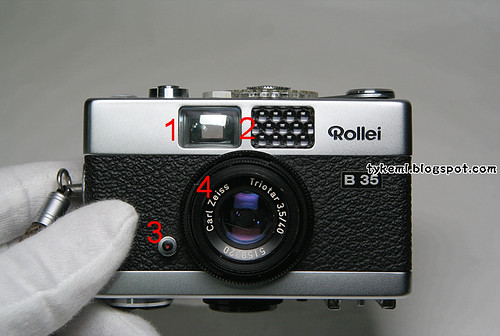
1.觀景窗
2.光電池測光區域
3.鏡頭縮回按鈕
4.鏡頭
光電池測光區域,拍照時千外別遮住,要不然測光會不準,雖然話說沒遮住也不一定準,不過可以利用調整ISO值得方式來補償,另外一提光電池測光就不用裝電池了,原理就像是太陽能電子計算機,有光才會動作。
鏡頭縮回按鈕在後面會解釋到,別急∼
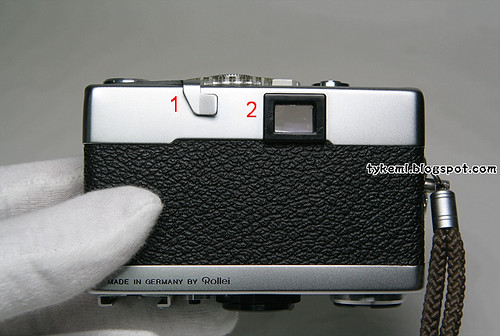
1.過片轉盤
2.觀景窗
Rollei 35全系列都是左手過片,和一般傳統的相機不依樣,非常特別
順帶一提,這台是MADE IN GERMANY!!
B35又德國製是相當稀少的,大部分常看到德製的都是35
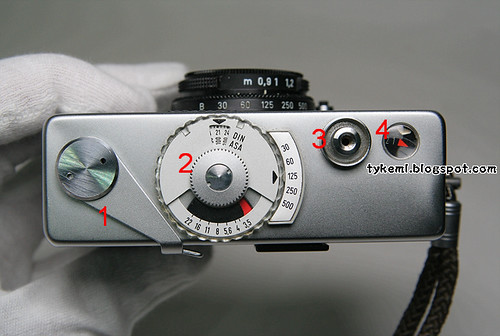
1.過片轉盤
2.測光表
3.快門鍵
4.計數器
測光表的部份會另外獨立出來解說
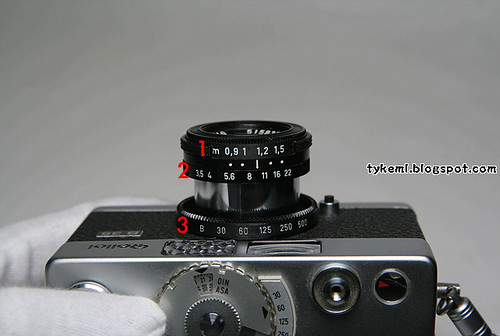
1.測距
2.光圈
3.快門
光圈和快門是可以依照測光的結果來調整(請看"測光表")
如果本身有測光觀念或是有測光表的話,可以直接調整來拍照
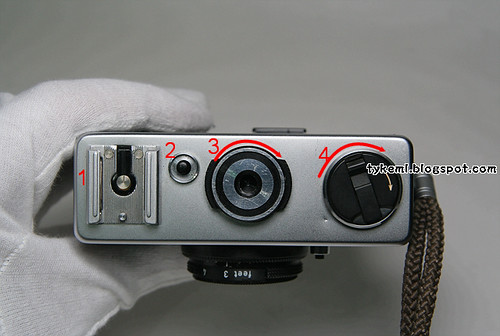
1.閃燈熱靴
2.退片鈕
3.背蓋轉盤
4.回片轉軸
我忘記背蓋轉盤轉哪邊才是正確的,不是這邊當然是另一邊,多試看看吧
順時針是關起,逆時針是打開
http://tykeml.blogspot.com/2007/11/rollei-b35-1rollei-b35.html
2007/12/10
今天要挑戰用一張圖片解釋B35的測光
而且圖片沒辦法標示,一標示就背遮住了
主角登場
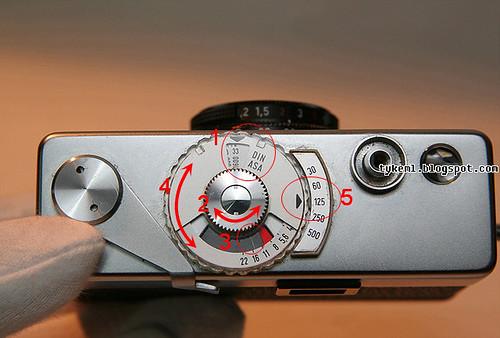
1.首先先調整ISO值,也就是相機上DIN/ASA那個地方(圓圈部份)
2.調整和底片一樣的曝光值,用你的指甲扣中間銀色的轉盤(有齒輪鋸齒狀的那圈)
3.接著指針就會依照光源不同跑動(目前是跑到16的地方)
4.轉動外圍的轉盤,把你要的光圈對準到白色指針的地方(目前是F16)
5.最後轉盤的箭頭指到125的地方,這就是用光圈決定的快門
上圖得數據是:底片設定是DIN33(對應到ISO是50度),光圈設定f16,快門設定125
接著轉動相機上光圈快門的設定

1.測距
2.光圈
3.快門
2007/11/10
因為Rollei 35系列的上片實在是∼∼∼全部一樣
所以就在這邊一次解決吧
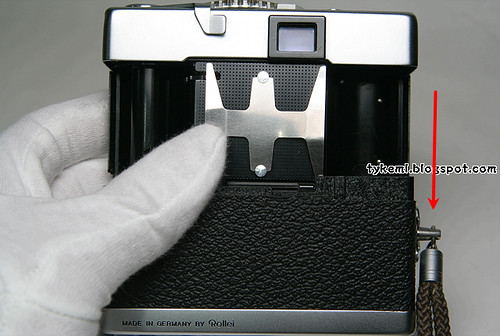
打開背蓋的開關後把背蓋往下拉就可以打開了
當然裝片的時候也是反方向操作
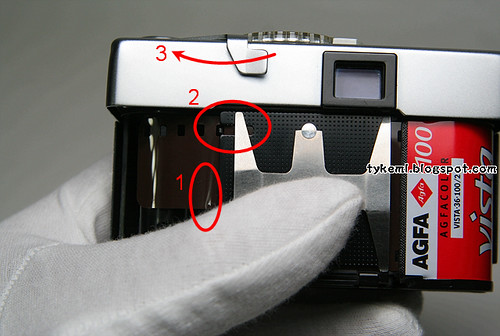
1.首先把底片的片頭往左邊拉,重點是卡進去過片軸的細縫中
2.然後把底片的尺孔對好紅圈的地方
3.此時我會用右手輕輕的壓住鐵片(圖片上左手壓住的地方),然後過片一張在確定尺孔使不是有對準,如給沒有對準就蓋上背蓋的話,保證你的底片會被捲斷
裝好後在把背蓋裝上就是上片完成了
*****************************************
LED的慢快門只到1/30再來就是B快門
所以這中間的速度就得要自己憑感覺了,35s的話則到1/2秒
所以如果在低光源的環境,35s就好用許多。
35s的鏡頭表現
當然要比LED優秀,而且機器的質感上真的很好,另外的優點
也是在鏡頭的部份,35s的鏡頭有2.8的大光圈,LED則是3.5
35s的口徑是30mm如果要接其他的濾鏡會比較容易找到
LED的24mm真的不太好找。
原味的Rollei 35那當然就是要找像35, 35s,或35T
如果你想拍的方便一點,35TE, 35TE,LED都是不錯的選擇(都是LED測光顯示)
Rollei XF 35是RF
但他是不同的設計
所以不能夠算是Rollei 35系列的成員
LED的測光,輕按快門就可以測光
35, 35s 35t則是在有光線的環境下指針就會有反應
所以平常最好收在沒有光線的環境
以免浪費電池
****************
2008/4/16
自從買了Rollei 35之後,深感原廠的拉鍊型皮套極為不便。沒辦法像單眼相機一樣,掛在脖子上。當然,Rollei原廠也有出硬式皮套(
見Tyke's Blog的原廠硬式皮套解說) 之外,eBay或者是一些拍賣網站也可見到他人製的速拍皮套。但不管原廠還是他人製皮套...價格實在是有一點給他...貴,一個都要台幣3000以上。 但如果網友們是只有一台的話,我建議就直接買別人做的。除非是像本人一樣有很多台,然後想要3~4個皮套的話,自己買道具等等的錢算下來後,是比較划算 的。
目前總共做了3個,一個給自己,另外的給老婆跟老妹。但自己留下來的比較讚,因為...用了Artisan&Artist的背帶~!哈哈~!Ok,下面就是圖片。
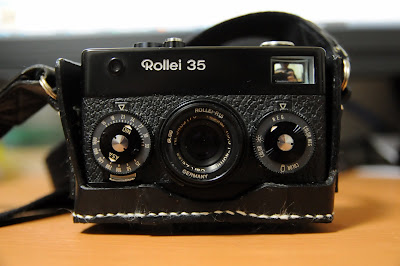
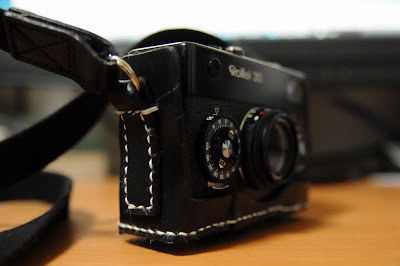
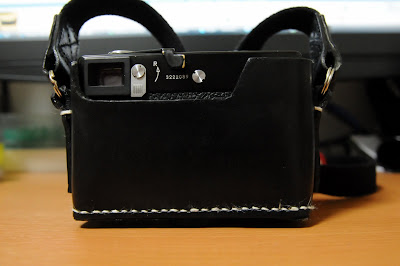
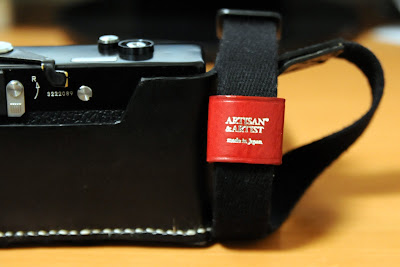
2008/3/22





















